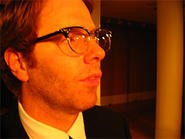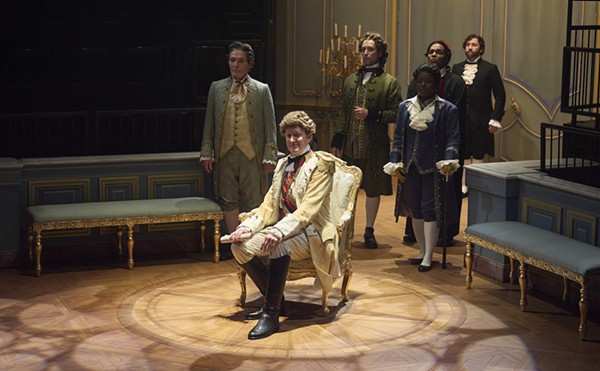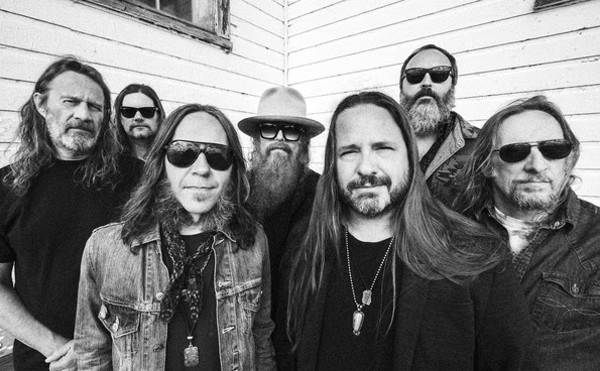The play is called, unhelpfully, Thom Pain (Based on Nothing), and it's a one-man, one-hour careening toboggan ride down an ice chute of childhood miseries, adult terrors, trap-door surprises, and acidly cryptic observations about identity, love, and the meaning of existence. And if that sounds self-important and pretentious, this piece is also unremittingly funny. But funny in ways that simultaneously (and intriguingly) make you question why the hell you're laughing.
Located in an empty retail space at Shaker Square -- Dobama's temporary digs for this and its next production -- the show could not be simpler. A single performer in black suit and tie faces a semi-circle of folding chairs with no set but a stool and no props except a dictionary that is put aside in the first couple of minutes. After that, it's all about the actor, Scott Plate, and his virtuosic command of a script that is so packed with lightning-quick takes, double takes, and philosophical glissandos that the audience is left panting.
The fellow at the center of this plotless 60-minute screed is a diffident, bespectacled nebbish who walks hesitantly over imaginary cracks and avoids eye contact. But then he changes for short bursts, and we see glimpses of other personalities: the affable host, the yearning lover, the lost little boy, the bully. In short, he's an everyman who contains within him the seeds and shards of people he might have been, absent the wounds that shaped his destiny.
But in this case, the sharp points are all exposed, allowing the audience to bleed along with him. Entering the playing area in the dark, Thom tries to light a cigarette -- it would be a pretty cool visual effect -- but he fails. And if you're into harbingers, you can take that one to the bank. He soon begins relating the story of a young boy, dressed in a cowboy outfit and idly writing in a puddle with a stick. Capturing in a single breath the mutable nature of words, the playwright moves quickly on and shares the first of the boy's tragedies.
Nothing, however, is terribly linear in this telling, and there is no consistent theme, save for free-floating fear -- of life, of the next moment, of the last second. Thom continually stops to contradict himself, leap into nonsensical digressions ("Now, it's time for a raffle!"), or ask questions of specific audience members, only to retract the query or answer it himself a nanosecond later. Under the brilliant direction of Joel Hammer, the timing is rapid-fire and precise, as if the character's neurons are speaking directly, without conscious editing, from somewhere deep within the warp and weft of his cranial cleft.
At times, Thom looks and sounds like deadpan comedian Steven Wright commenting on his love life: "'You've changed,' she said the night we met." And "I'd like to take you home, leave you there, and go somewhere else." When he's not being amusing, Thom is beset on all sides by shadowy threats, noting that "Our cancers are all in place. And nature laughs last and laughs best, deep into the night."
Jumping back and forth in time, playwright Will Eno paints graphic and memorable word pictures. For example, Thom relates that the same young boy (no secret, it's himself) was attacked in a meadow by a swarm of bees. But he became disoriented, thinking the pain was coming from within him and the bees were there to help. So he kept reaching into the hive with his swollen hands to rub the bees on his body. While the image is meant to creep us out, and does, the symbolic heft of the thought -- why do we often continue doing those things that hurt us? -- rapidly overwhelms the ick factor.
Scott Plate's performance of this challenging, whirling-dervish script is simply a revelation. Without the aid of any physical antics (he basically only stands slump-shouldered or shuffles here and there), Plate manages to electrify the air with verbal pirouettes and pacing pyrotechnics, delivering stream of consciousness at the speed of sound. Using the tired canard of asking for volunteers, Plate toys with the audience and peels away the insular distance between actor and observer.
In short, this is a theatrical experience to see, cogitate on, and treasure. Don't let it slip away.













